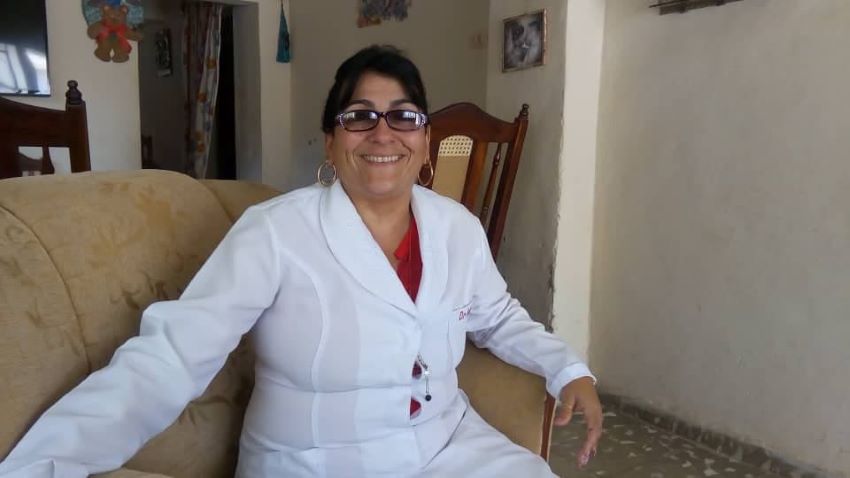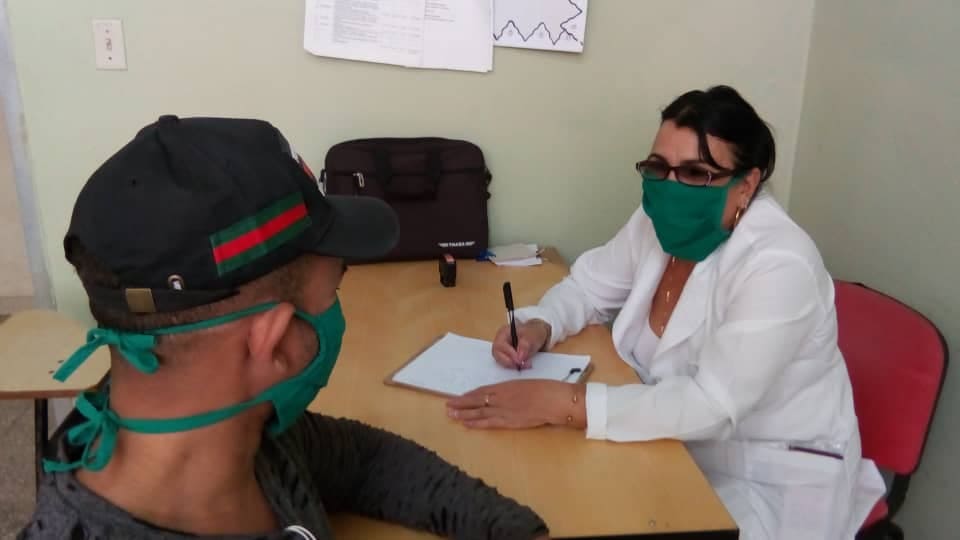
Maura Ávila Castro decided her professional future in her childhood. From very early on she knew that relieving pain and discomfort would be her path.
Las Tunas, Cuba - Her father's constant allergic crises and asthma attacks sowed in her childhood dreams the aspiration of removing that heavy burden from her father. "I am going to cure you", she prophesied then in an aspiration that life has shown her that in matters of allergies it is not possible. "Although the disease, if treated, is controlled," says the doctor and current head of the Provincial Allergy Group.
But to travel this road has not been easy. To possess in her hands this title is incentive before the father's chronic asthma and the frequent allergies in the family and in the population of Las Tunas, in general; it implied a lot of effort: to overcome the economic difficulties aggravated with the so called Special Period, the distance of the home, the distance of his small daughter... The capital of the country and the specialty seemed a binomial difficult to conquer.
"I studied the specialty in Havana and it was difficult; it was the 90s and I had to rent a room because I didn't have the possibility to stay at the students dorms. Even so, I decided to go, because I wanted to do my specialty. Thanks to the help of my parents, I was able to finish my studies, since I was only paid 416.00 pesos and the rent was 400.00."
From those years she now has a smile and a spontaneity that makes her close and reveals the stature of someone who recognizes that, along with the difficulties and sacrifices, came also a high standard training, with teachers who trained her in the virtuosity of the specialty and the profession.
That courage, persistence and willingness would be put to the test again; first in the Bolivarian Republic of Venezuela, where she served as an internationalist mission for five years, and then in Brazil, as part of the More Physicians Program. From both places, she returned with her mission well accomplished and her soul full of stories and convictions.
The memories of both experiences are many, one in particular has been treasured as a measure of the dedication of Cuban professionals, whose performance abroad has been the subject of numerous campaigns in pursuit of staining a noble and humanist practice.
"In Brazil they did not believe that a doctor, who for them is someone of high standing, was in those poor neighborhoods, treating people without resources, whom we were going to see even without them coming to us. They did not believe that it was possible for us to be doctors and we had to fight hard."
"A year after we were in a very needy and dangerous community we were visited by some journalists. They asked what we were doing there and when I answered that we were assisting the people, as part of an agreement between the two governments, and that we as doctors were in a position to do so and to assist those who needed our work, they said that it was a lie, that how we were going to be there just for fun.
"We gave so much of our intellect and Cuban charisma that in the end I was even published in a newspaper: 'The Cuban doctor who says that the only thing she feels is Portuguese', because the language was the one that gave us a little difficulty, there were still things that we did not know how to say."
Those experiences in other lands of the world gave this daughter, mother, wife and courageous woman, the immense pride of having helped those who were plunged into oblivion and despair. Before the departure, the emotions and the inner yearning were summarized in one sentence. "Here I come, my beautiful Cuba!"
Feet on the ground and pondering that experience, she says: "In the end, you feel a great pleasure of having assisted in a country that needs it. Personally, I brought a lot of affection to Cuba, I still have friends who write or call me. Professionally, we face many illnesses and this work nourishes us on how to apply the protocols in cases that we study in our career, but that in our country, thank God, do not manifest themselves. One leaves with more firmness and knowledge."
THE SPECIALTY IN TIMES OF PANDEMIC
 The World Health Organization estimates that by 2050 approximately half of the world's population will suffer from at least one allergic disorder. At one point, experts in the field even classified it as the pandemic of the 21st century; although at this point and given the disastrous global effects caused by COVID-19, we doubt that another condition will achieve such "merit."
The World Health Organization estimates that by 2050 approximately half of the world's population will suffer from at least one allergic disorder. At one point, experts in the field even classified it as the pandemic of the 21st century; although at this point and given the disastrous global effects caused by COVID-19, we doubt that another condition will achieve such "merit."
Given the danger posed by SARS-CoV-2, Dr. Maura stressed that "the allergic person must take great care of respiratory infections. And, if the coronavirus is a respiratory infection, and of high virulence, precautions and environmental control measures should extreme.
"Many patients, before the appearance of the virus, we suggested using the mask to protect themselves from vehicle smoke, street dust and so on, because now with greater intensity can not miss this barrier of containment. In addition, they must maintain the inter-crisis treatment and environmental control actions in order to avoid complications," she stressed.
"Every patient in this practice already knows that they have to avoid dust and the use of curtains; use wet cloths for cleaning the home; never sweep or shake, but rather wash, and avoid humidity, because this is conducive to the appearance of fungi," she added.
In the same way, before the danger of the COVID-19, national and international experts recommend, to this population group, to avoid the carpets and to be cautious in the use of the disinfectants. In the rooms, the levels of mites should be reduced by covering the mattresses and pillows with covers. In addition, absolute respect should be given to allergy treatment as a way to avoid the typical symptoms that can lead to touching the nose and eyes with dirty hands and consequently increase the risk of contracting SARS-CoV-2.
In this sense, by reducing sneezing and coughing, the possibility of contagion to other people is reduced, in view of the possibility of being a carrier of COVID-19 without knowing it. Similarly, timely therapy lowers the risk of respiratory crisis that would lead to an emergency room, a place that, in these times, is best avoided.
"We stop this virus together", that is the maxim for Dr. Maura Ávila Castro, head of the Provincial Allergy Group; a valid assertion for the whole Cuban population, whose first duty is to take care of their health and also to reward the dedication and devotion of those who, like this allergist, take care of the life of a whole people with their work.





